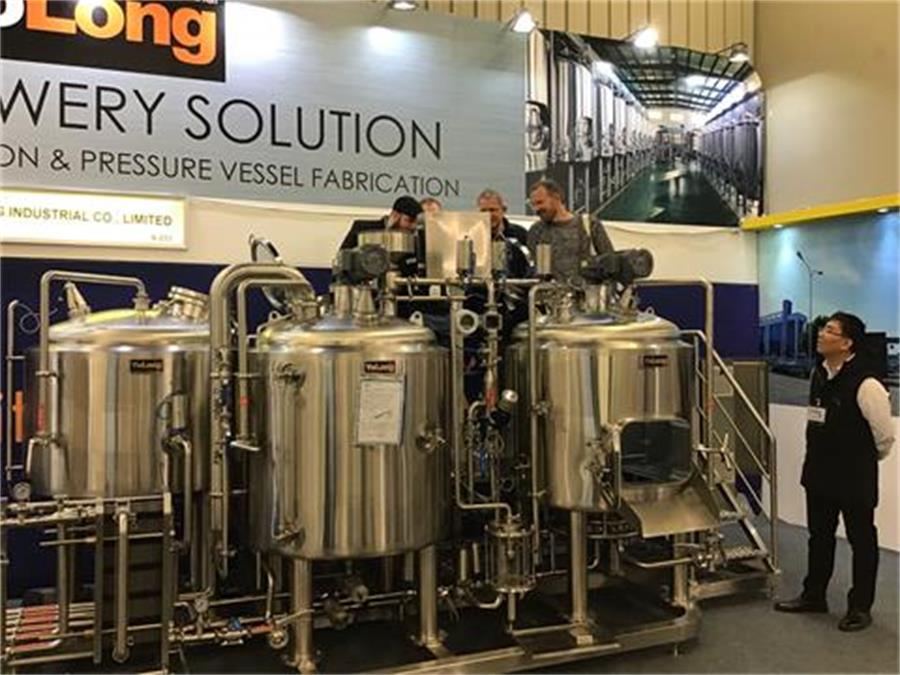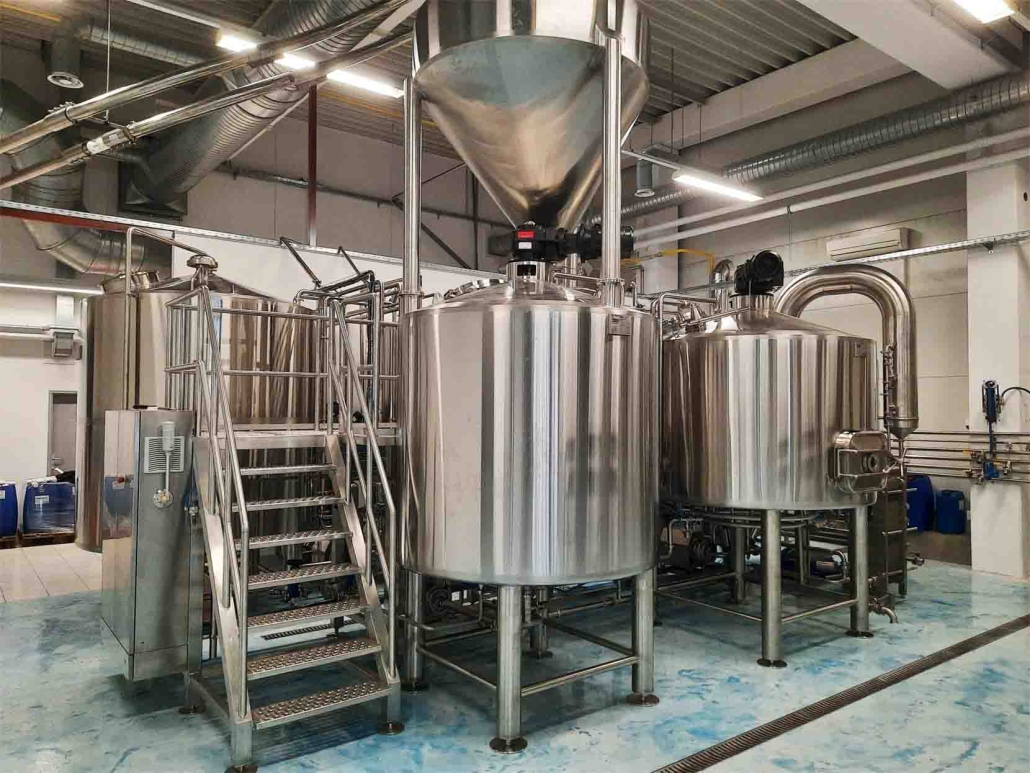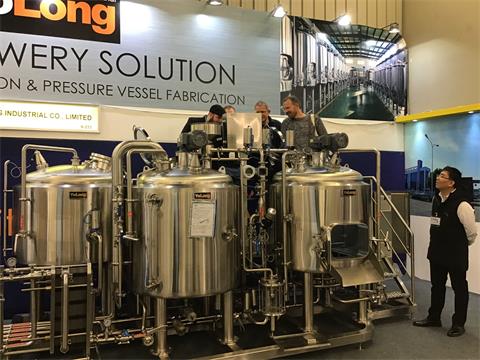Understanding the Conical Fermentation Vessel
Overview of Conical Fermentation Vessels
When diving into the world of brewing, whether you’re a seasoned brewer or a novice, the conical fermentation vessel (CFV) is an essential piece of equipment you’ll encounter. Often referred to as the backbone of any brewing setup, this vessel has revolutionized the fermentation process, offering both efficiency and quality that traditional flat-bottomed vessels can’t match. But what exactly is a conical fermentation vessel, and why is it so critical to the brewing process?
The conical fermentation vessel is designed with a cone-shaped bottom that allows for the separation of yeast and sediment from the liquid during fermentation. This unique design is not just for aesthetic purposes; it’s a practical solution that enhances the quality and ease of brewing, especially when dealing with large batches of beer. The shape facilitates a more efficient fermentation process by enabling the easy removal of trub (the solid particles that settle during brewing), reducing the risk of contamination, and ultimately producing clearer beer with less manual intervention.
The Role of Conical Fermentation Vessels in Brewing
In brewing, fermentation is the critical phase where yeast converts sugars into alcohol and carbon dioxide. The conical fermentation vessel optimizes this process by providing a controlled environment where yeast can thrive and where waste products can be efficiently removed. This efficiency leads to several benefits, including faster brewing cycles, improved beer clarity, and the ability to harvest yeast for reuse in future batches, which is particularly advantageous for commercial brewers.
Let’s delve deeper into the specifics of conical fermentation vessels and how they compare to other fermentation options, exploring their advantages, design considerations, and how to choose the right vessel for your brewing needs.

Conical Fermentation Vessel Equipment Guide
Understanding the Design and Functionality
The conical fermentation vessel’s design isn’t just about looks; it’s a functional innovation that has made a significant impact on the brewing industry. These vessels are usually made from stainless steel, which offers durability and ease of cleaning—two crucial factors in brewing. The cone-shaped bottom allows sediment and yeast to collect in the cone, where it can be easily removed through a bottom valve, leaving the beer clear and ready for further processing.
Materials and Construction
Stainless steel is the material of choice for most conical fermentation vessels. Its non-reactive nature ensures that your beer’s flavor isn’t tainted by the container, and its strength means it can withstand the pressures of fermentation and cleaning. The smooth surface of stainless steel also makes it easy to sanitize, which is essential in preventing contamination.
Features and Specifications
Conical fermentation vessels come with various features that enhance their functionality:
- Pressure Relief Valve: Ensures safety during the fermentation process by allowing excess CO2 to escape.
- Thermowell: A built-in feature that allows you to monitor the temperature inside the vessel without opening it, maintaining a sterile environment.
- Sampling Valve: Allows brewers to take samples of the beer during fermentation to monitor its progress.
- CIP (Clean-In-Place) System: Facilitates easy cleaning without disassembling the vessel.
Types of Conical Fermentation Vessels
Different brewers have different needs, and the market offers a variety of conical fermentation vessels to meet these demands. Whether you’re brewing at home or on a commercial scale, there’s a vessel that’s right for you.
| Type | Material | Best For | Capacity Range | Key Features |
|---|---|---|---|---|
| Homebrew Conical Fermenter | Stainless Steel or Plastic | Homebrewers | 1-14 gallons | Compact, affordable, easy to clean |
| Commercial Conical Fermenter | Stainless Steel | Microbreweries, Large-Scale Operations | 1-300+ barrels | CIP systems, advanced temperature controls, yeast harvesting |
| Unitank Fermenter | Stainless Steel | Versatile Brewing | 3-300+ barrels | Fermentation and carbonation in one tank, pressurizable, versatile use |
Homebrew Conical Fermenters
For the passionate homebrewer, a conical fermenter can elevate your brewing game. These vessels, typically ranging from 1 to 14 gallons, are designed for ease of use and cleaning. They’re often made from food-grade plastic or stainless steel, with stainless steel being preferred for its durability and ease of sanitation.
Commercial Conical Fermenters
On the other hand, commercial conical fermenters cater to microbreweries and large-scale brewing operations. These vessels are built for efficiency, featuring advanced temperature control systems, CIP systems for easy cleaning, and the ability to harvest yeast for reuse. Capacities range widely, from 1 barrel for smaller operations to over 300 barrels for larger breweries.
Unitank Fermenters
Unitanks are the versatile workhorses of the brewing world. They allow for both fermentation and carbonation in a single vessel, which can save time and space in a busy brewery. These vessels are built to handle pressure, making them suitable for a variety of brewing processes.
The Brewing Process with a Conical Fermentation Vessel
Step-by-Step Brewing
The brewing process with a conical fermentation vessel is straightforward yet sophisticated. Here’s how it typically unfolds:
- Wort Preparation: The process begins with the preparation of the wort, the sugary liquid extracted from malted grains.
- Fermentation: The wort is transferred into the conical fermenter, where yeast is added. The vessel’s design allows for easy monitoring and adjustment of temperature and pressure.
- Trub Separation: As fermentation progresses, the conical shape facilitates the settling of trub and yeast at the bottom. These can be removed periodically through the bottom valve, keeping the beer clear.
- Yeast Harvesting: The conical fermenter makes it easy to harvest yeast for reuse, an essential practice in commercial brewing.
- Final Conditioning: After fermentation, the beer can be conditioned in the same vessel or transferred to another container for aging or carbonation.
Key Considerations in the Brewing Process
Using a conical fermentation vessel can streamline your brewing process, but there are a few things to keep in mind:
- Temperature Control: Maintaining a consistent temperature is crucial for proper fermentation. Many conical fermenters come equipped with temperature control jackets or integrated cooling systems.
- Cleaning and Sanitization: Given the importance of sanitation in brewing, conical fermenters are designed to be easy to clean, often featuring CIP systems that allow you to clean the vessel without disassembly.
- Pressure Management: Conical fermenters are often pressurizable, which is beneficial for certain types of beers like lagers that require carbonation under pressure.
Comparing Conical Fermentation Vessels: Capacity, Space, Design, and Customization
Choosing the right conical fermentation vessel involves considering various factors, including capacity, available space, design, and customization options. Here’s a breakdown:
| Feature | Details |
|---|---|
| Capacity | Varies widely from small 1-gallon homebrew vessels to large 300-barrel commercial tanks. Choose based on your brewing scale. |
| Space Requirements | Homebrewers need compact designs, while commercial operations require larger footprints, sometimes with stackable units. |
| Design Considerations | Look for smooth welds, easy-access ports, and a sturdy base. Commercial units may offer integrated cooling jackets and CIP systems. |
| Customization Options | Larger vessels offer customization options like additional ports, pressure ratings, and specialized coatings or finishes. |
Conical Fermentation Vessel Suppliers and Price Range
Investing in a conical fermentation vessel is a significant decision, so it’s important to know your options in terms of suppliers and pricing. Here’s an overview:
| Supplier | Price Range | Notable Features |
|---|---|---|
| Blichmann Engineering | $200 – $1,000+ | High-quality homebrew fermenters with features like Fermenator technology for ease of use. |
| Ss Brewtech | $500 – $5,000+ | Offers a range of conical fermenters for both home and commercial use, known for their durability and innovation. |
| Speidel | $300 – $3,000+ | German-engineered fermenters with robust build quality and precision engineering. |
| Custom Commercial Suppliers | $5,000 – $50,000+ | Tailored solutions for large-scale breweries, offering extensive customization and advanced features like CIP systems and cooling jackets. |
Factors Influencing Price
Several factors influence the price of a conical fermentation vessel, including:
- Material Quality: Stainless steel is more expensive but offers better durability and ease of cleaning.
- Size and Capacity: Larger vessels naturally cost more due to the increased material and construction costs.
- Additional Features: Advanced features like temperature control, pressure capability, and CIP systems add to the cost.
Installation, Operation, and Maintenance of Conical Fermentation Vessels
Installation Considerations
Setting up a conical fermentation vessel requires careful planning, particularly for larger commercial units. Factors to consider include the available space, the need for reinforced flooring (due to the weight of the filled vessel), and access to utilities such as water and power.
Operational Best Practices
Operating a conical fermenter involves maintaining strict control over the fermentation environment. This includes:
- Monitoring Temperature: Use built-in thermowells and cooling jackets to keep the temperature within the optimal range for yeast activity.
- Pressure Management: Ensure that pressure relief valves are functioning correctly to avoid over-pressurization.
- Sampling and Adjustments: Regularly sample the beer to monitor its progress and make any necessary adjustments to temperature or pressure.
Maintenance Guidelines
Regular maintenance is key to the longevity and performance of your conical fermenter. This includes:
- Regular Cleaning: Use the CIP system to clean the vessel after each batch, ensuring no residue remains that could contaminate future brews.
- Inspection: Regularly inspect seals, gaskets, and valves for wear and tear, replacing them as necessary.
- Calibration: Ensure that temperature sensors and pressure gauges are calibrated correctly to maintain accurate readings.
How to Choose the Right Conical Fermentation Vessel Supplier
Choosing the right supplier is crucial for ensuring that you get a high-quality conical fermentation vessel that meets your needs. Here are some key considerations:
| Criteria | Details |
|---|---|
| Reputation | Look for suppliers with a strong reputation in the brewing industry, known for delivering reliable, durable equipment. |
| Customization | Ensure the supplier offers customization options if you have specific requirements for your brewing process. |
| Support and Service | Choose a supplier that offers excellent customer service, including installation support and ongoing maintenance services. |
| Pricing Transparency | Look for suppliers that provide clear, transparent pricing without hidden fees or charges. |
| Warranty and Guarantee | Check for warranties or guarantees that protect your investment, particularly for expensive commercial units. |

Comparing Suppliers: Pros and Cons
Different suppliers offer different strengths and weaknesses. Here’s how some of the top suppliers compare:
| Supplier | Pros | Cons |
|---|---|---|
| Blichmann Engineering | High-quality build, innovative features, strong customer support | Higher price point, limited customization |
| Ss Brewtech | Durable, wide range of sizes, good for both home and commercial use | Can be expensive, some advanced features only on larger models |
| Speidel | Precision engineering, durable construction, good reputation | Higher cost, fewer customization options |
| Custom Suppliers | Tailored to specific needs, extensive features | Expensive, longer lead times, complex installation |
FAQ
| Question | Answer |
|---|---|
| What is a conical fermentation vessel? | A specialized fermentation tank with a cone-shaped bottom that allows for the easy removal of sediment and yeast. |
| Why use a conical fermentation vessel? | It offers efficiency in the brewing process, clearer beer, easy yeast harvesting, and better control over the fermentation environment. |
| How do I clean a conical fermentation vessel? | Most vessels come with a CIP (Clean-In-Place) system, allowing you to clean the vessel without disassembly by circulating cleaning solutions through the tank. |
| Can I use a conical fermentation vessel for both homebrewing and commercial brewing? | Yes, conical fermenters are available for both homebrewers and commercial brewers, with varying sizes and features to suit different needs. |
| What size conical fermenter should I buy? | This depends on your brewing scale. Homebrewers typically use 1-14 gallon fermenters, while commercial operations may need vessels up to 300 barrels or more. |
Share this entry
Interested in learning more about Brewing Systems including additional details and pricing information? Please use the form below to contact us!
YOLONG BREWERY EQUIPMENT FAQS
- Commercial Brewery / Craft Brewery / Microbrewery / Nanobrewery
- What is The Difference Between Craft Beer and Industrial Beer?
- The Bespoke Differences In Custom Brewing Systems
- Everything You Need to Know About Kettle Souring
- How to Choose Brewing Equipment for Your business?
- How To Choose The-Best Partner To Build Your Commercial Microbrewing System?
- Two Detection Sensors That You Need To Use In Your Brewhouse System
- Remote Control Applications in Brewing Equipment/How does it work?
- How To Clean Your Brand New Brewery Tanks?

